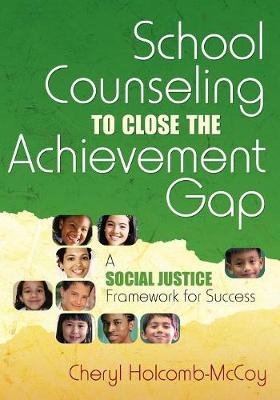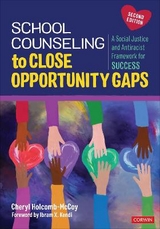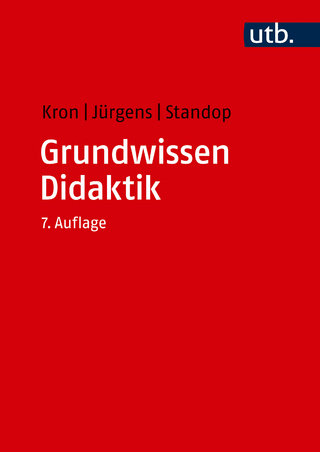
School Counseling to Close the Achievement Gap
Corwin Press Inc (Verlag)
978-1-4129-4184-6 (ISBN)
- Titel erscheint in neuer Auflage
- Artikel merken
School counsellors can play a powerful role in closing the achievement gap by incorporating principles of social justice - that is, equity and advocacy for all students - into their practice. This new resource for pre-service and in-service counsellors addresses the reasons why some students are more likely to encounter academic failure (racism, sexism, heterosexism, classism), and challenges readers to play an active role in bringing about the conditions for student success. Offering a variety of vignettes, strategies, activities, and reflective individual and group study questions, the book provides the framework for how school counsellors can mitigate the impact of negative factors hampering academic performance and healthy development. The book details six functions of a school counsellors that move schools toward more just practices and, ultimately, to higher test scores and increased student achievement.
Dr. Cheryl Holcomb-McCoy believes in the revolutionary power of school counseling. An American Counseling Association (ACA) Fellow with 30 years of experience as a former kindergarten teacher, elementary school counselor, family therapist, and most recently university professor and administrator, she has a wealth of knowledge, expertise, and wisdom. Dr. Holcomb-McCoy is currently the Dean of the School of Education and a professor at American University (AU). She is also the author of the best-selling book School Counseling to Close the Achievement Gap: A Social Justice Framework for Success (1st edition) and her upcoming book, Antiracist Counseling in Schools and Communities (ACA Publishing). In her five years as Dean, Dr. Holcomb-McCoy founded AU’s Summer Institute on Education, Equity and Justice, and the AU Teacher Pipeline Project, a partnership with the DC Public Schools and Friendship Charter Schools. She is also actively working to develop an antiracist curriculum for teachers-in-training. Prior to leading the School of Education at AU, she served as Vice Provost for Faculty Affairs campus-wide and Vice Dean of Academic Affairs in the School of Education at Johns Hopkins University. She launched the Johns Hopkins School Counseling Fellows Program and The Faculty Diversity Initiative. Dr. Holcomb-McCoy has also been an associate professor in the Department of Counseling and Personnel Services at the University of Maryland College Park and Director of the School Counseling Program at Brooklyn College of the City University of New York. A decorated scholar, she has written 16 chapters in edited books and more than 40 articles in peer-reviewed journals. From 2014 to 2016, she served as a consultant to former First Lady Michelle Obama’s Reach Higher Initiative, a program dedicated to supporting first-generation students make it to and through college. She also serves on the board of Martha’s Table - a nonprofit that supports health and wellness for children and families in the nation’s capital. Dr. Holcomb-McCoy’s passion for school counseling, mental health, and wellness starts at home. As a proud mother of two, she knows firsthand the importance of systemic change to help students reach their full potential. A proud member of Delta Sigma Theta Sorority, Inc., Dr. Holcomb-McCoy holds her bachelor′s and master′s degrees from the University of Virginia. In addition, she earned a doctorate in Counseling and Counselor Education from the University of North Carolina at Greensboro. She lives in Potomac, Maryland, with her husband and two children.
Preface
Acknowledgments
About the Author
1. The Achievement Gap: Our Ultimate Challenge
School Counseling and the Gap
Where We Have Been and Where We Are Headed
The Power of School Counselors
Achievement Gap Defined
A Closer Look at the Gap
What Do We Know About Closing the Gap?
Questions to Consider
2. School Counseling Within the Context of Social Justice
Redefining School Counseling to Serve Diverse Groups
Focusing on Social Justice
Key Functions of School Counseling Based on a Social Justice Approach
Questions to Consider
3. Counseling and Intervention Planning
Critical Factors That Affect School Counseling and the Counseling Relationship
Culturally Appropriate Counseling Interventions
Assessing School Counselors′ Multicultural Counseling Competence
The Influence of Culture on Intervention Planning
Questions to Consider
4. Consultation
Defining Consultation
Social Justice Considerations and the Consultation Process
Consultation Strategies
Questioning Domains
Assessing School Culture
Questions to Consider
5. Connecting Schools, Families, and Communities
Avoid the Blame Game
Five Principles of Effective SFC Partnership
Barriers to School-Family Collaborations
Questions to Consider
6. Collecting and Using Data
What Is Accountability?
Using Data to Uncover Inequities
School Counseling Program Evaluation
Developing Program Assessment Tools
Questions to Consider
7. Challenging Bias
Guidelines for Challenging Bias
Social Justice Education in Schools
Questions to Consider
8. Coordinating Student Services and Support
Collaborating With Community Organizations and Social Service Agencies
Implementing Scheduling Practices That Encourage Rigorous Course Taking
Coordinating College Preparation Interventions
Coordinating Tutoring Services
Participating on Individualized Education Program Committees
Participating on Gifted and Talented Committees
Questions to Consider
9. Doing the Right Thing: Developing a Social Justice–Focused School Counseling Program
Assessing Your Beliefs
Assessing Your Skills
Assessing Your Students′ Needs
My Vision for My School Counseling Program
Concluding Remarks
Resources
Resource A: Assessing School Equity
Resource B: School Counselor Multicultural Competence Checklist
Resource C: School Culture Assessment
Resource D: Assessing Beliefs About School-Family-Community Partnership Involvement
Resource E: SOARING Samples and Worksheets
Suggested Readings by Topic
References
Index
| Erscheint lt. Verlag | 7.8.2007 |
|---|---|
| Verlagsort | Thousand Oaks |
| Sprache | englisch |
| Maße | 177 x 254 mm |
| Gewicht | 370 g |
| Themenwelt | Sozialwissenschaften ► Pädagogik ► Didaktik |
| Sozialwissenschaften ► Pädagogik ► Sonder-, Heil- und Förderpädagogik | |
| ISBN-10 | 1-4129-4184-9 / 1412941849 |
| ISBN-13 | 978-1-4129-4184-6 / 9781412941846 |
| Zustand | Neuware |
| Informationen gemäß Produktsicherheitsverordnung (GPSR) | |
| Haben Sie eine Frage zum Produkt? |
aus dem Bereich



